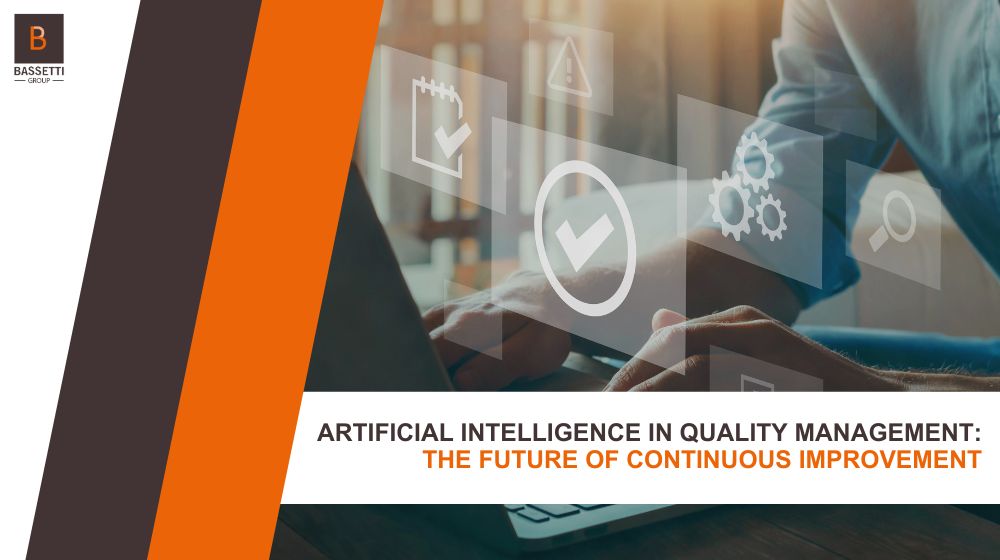AI in Quality Management: The Future of Continuous Improvement
Organizations are increasingly using Artificial Intelligence (AI) to strategically optimize their quality management systems (QMS). From automotive and aerospace to advanced manufacturing, companies must uphold demanding standards such as ISO 9001 while ensuring customer satisfaction, audit readiness, and process compliance. For quality managers, R&D directors, and program managers, this requires structuring robust, traceable, and data-driven systems that minimize defects, drive continuous improvement, and establish supplier-customer trust.
Recent reports have revealed that organizations that integrate AI into their quality systems experience up to a 30% increase in operational efficiency and a 25% reduction in quality-related incidents. These results show how AI enhances data analysis, predictive quality, and compliance automation, transforming the way teams manage and improve quality.
This article explores how AI-powered tools embedded in QMS software are redefining the quality approach—from risk analysis and non-conformance management to audit automation and process optimization.

AI in Quality by Design and Risk Analysis
One of the most impactful areas of AI implementation is in the early design and quality by design stages, particularly through advanced risk analysis. AI helps simulate design outcomes, identify potential failure modes, and recommend corrective actions before production begins. For development project managers, this means:
- Enhanced Failure Mode and Effects Analysis (FMEA)
- Real-time identification of high-risk components or processes
- Prioritized risk mitigation based on historical data and pattern recognition
- Automated Design of Experiments (DoE) to optimize manufacturing parameters
- Scenario modeling for potential quality deviations
These proactive tools reduce late-stage design changes and empower teams to make informed decisions that align with compliance and performance standards.
AI for Continuous Improvement and Non-Compliance Management
Continuous improvement is at the core of modern quality strategy, and AI enhances this through predictive analysis, real-time alerts, and automated root cause detection.
AI systems can:
- Analyze trends in non-conformance (NC) reports to detect patterns
- Automatically prioritize incidents by severity and impact
- Recommend CAPA actions using 8D problem-solving methodologies
- Identify recurring quality issues across production sites
- Deliver dashboards for real-time performance monitoring
This data-driven approach eliminates bottlenecks and empowers quality teams to shift from reactive responses to proactive process optimization.
AI in Quality Assurance, Quality Control, and Audit Readiness
In sectors governed by strict quality standards, audit preparation and document control are time-intensive tasks. AI simplifies these with:
- Automated generation of audit trails
- AI-based document validation and categorization
- Real-time compliance monitoring
- Advanced search functions via natural language processing
- Intelligent reminders and document expiration alerts
These features not only boost efficiency but improve traceability and readiness for quality audits, ensuring smooth evaluations by external auditors or internal stakeholders.
AI-Powered Quality Control and Complaint Management
AI is transforming the detection and management of product defects and customer complaints:
- Computer vision identifies anomalies on the production line in real-time
- Historical data analysis helps find recurring non-compliance events
- CAPA processes are automated based on previous resolutions
- Ongoing monitoring of corrective actions ensures they’re effective
- Voice and text analytics evaluate the sentiment behind customer complaints
This reduces human error, improves inspection accuracy, and strengthens the link between customer satisfaction and internal quality systems.
AI for Predictive Quality and Smart Process Optimization
AI brings a predictive layer to quality systems, allowing teams to detect and address issues before they escalate:
- Predictive maintenance based on IoT and sensor data
- Dynamic quality benchmarks that adjust to real-time conditions
- Improved traceability and error reduction across the value chain
- Performance scoring for suppliers and production lines
- Visual dashboards highlighting risk-prone areas
This creates a smarter, self-learning QMS that supports long-term performance improvement and cost reduction.
AI and Knowledge Management in the Quality Ecosystem
AI enhances knowledge management by making past experience actionable:
- AI-powered chatbots offer real-time access to quality data
- NLP-based systems help retrieve documents using simple queries
- Sentiment analysis of customer feedback drives iterative product and process improvements
- Recommendation engines suggest quality documents, procedures, or training content based on employee queries
By promoting knowledge sharing, AI strengthens a continuous learning culture across the quality organization.
AI in Electronic Document Management (EDM) for Quality
Managing large volumes of documentation is a core challenge in quality systems. AI simplifies EDM by:
- Automatically indexing documents and metadata tagging
- Enabling contextual and voice-activated searches
- Translating documents across languages for global operations
- Summarizing lengthy SOPs and technical documents for faster review
Combined with secure access control and audit logging, AI ensures that quality teams can find, review, and manage documentation more efficiently and accurately.
Improving Quality Audits and Assessments with AI
AI makes Layered Process Audits (LPAs) and internal quality assessments more dynamic:
- Intelligent audit scheduling based on risk scoring
- Tailored audit checklists generated from historical non-conformities
- Real-time data capture via mobile apps with voice-to-text integration
- Automatic reporting with highlights of critical findings
This streamlines the audit lifecycle and ensures readiness for third-party assessments.
Challenges and Limitations of AI in Quality Management
Despite its potential, integrating AI into QMS presents notable challenges:
- Data quality and consistency must be ensured for accurate predictions
- Human oversight remains critical for validating AI recommendations
- System integration can be complex, especially with legacy platforms
- Security and privacy concerns demand robust controls (e.g., ISO 27001 compliance)
- Change management is necessary to ensure adoption by all stakeholders
Companies must adopt a balanced strategy that combines AI efficiency with human expertise and governance.
TEEXMA for Quality
TEEXMA for Quality exemplifies this new generation of digital QMS software designed to harness AI’s full potential. With integrated modules for FMEA, design control, audit management, risk analysis, and corrective action tracking, TEEXMA enables organizations to streamline their quality processes while ensuring full compliance with standards like ISO 9001 and IATF 16949. Its intuitive interface and real-time analytics foster collaboration across teams, driving continuous improvement and operational excellence. By centralizing quality data and automating workflows, TEEXMA empowers decision-makers with actionable insights, enabling faster root cause identification and more effective corrective actions.
Choosing TEEXMA for Quality means adopting a future-proof quality management system that evolves with your organization’s needs. It transforms quality assurance from a compliance requirement into a competitive advantage—allowing you to exceed limits, reduce risk, and build lasting trust with customers and suppliers alike. As AI continues to advance, integrating solutions like TEEXMA into your QMS is essential for staying ahead in today’s demanding industrial environments.
AI as a Catalyst for Quality Innovation
Artificial Intelligence is fundamentally reshaping the landscape of quality management. No longer confined to manual processes and reactive problem-solving, AI empowers organizations to move towards a proactive, data-driven quality culture. By harnessing AI’s power to analyze vast datasets, anticipate risks, and automate routine tasks, quality teams can dramatically enhance efficiency, reduce costs, and deliver products that consistently exceed customer expectations. In an era where regulatory demands and market pressures continually rise, AI-driven quality management is not just a technological upgrade—it is a strategic imperative for long-term success and competitiveness.
